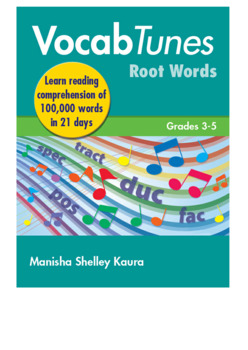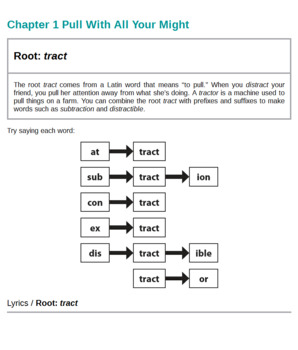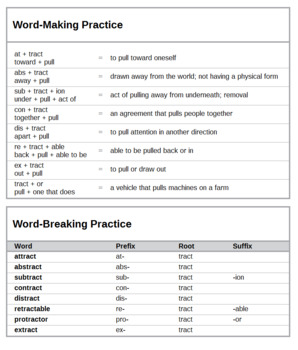Vocab Tunes English Vocabulary Building & Comprehension Program 3rd to 5th Grade
VocabTunes
3 Followers
Grade Levels
4th - 6th, Homeschool
Subjects
Resource Type
Formats Included
- Open Publication Structure eBook File
Pages
74 pages
VocabTunes
3 Followers
Description
The Vocab Tunes English vocabulary building and reading comprehension program was started by a young student, Manish Shelly Kaura, when she went to her father expressing the frustration and annoyance she had with the way her school was trying to teach English vocabulary to her and her classmates.
Manisha and her father, S. R. Kaura MD, began to study the language of English together. At first, the goal was to make sense of her homework but quickly turned into a passion.
A passion for understanding the English language. Eventually, a passionate quest to create a method for learning English vocabulary. One that would accelerate the process and make it easy for any child or person regardless of their current vocabulary proficiency.
Manisha says, “We started intensively studying both etymology and the languages themselves, and we acquired excellent reading and writing efficiency in both ancient Greek and Latin. Then we were able to compile several manuscripts. There were just notes. My impressions as a student, and his impressions as a parent."
It took ten years of research and work for Manisha to bring her vision to fruition.
Manisha says, "It’s my life’s passion. It’s something I plan on dedicating my life to. I’d like to see ‘Vocab Tunes’ improve test scores and help overcome the inequities we see in teaching and parents. A lot of in-need children don’t have parents they can have a close relationship with.”
Manisha’s books and her Vocab Tunes English vocabulary and reading comprehension program have been very successful. From receiving the Gary Lynch – Quality, Excellence and Design award, to being translated in 4 languages.
Many students have difficulty with reading comprehension due to a lack of knowledge of basic vocabulary. Using tunes (songs) to help students remember the meanings of prefixes, suffixes, and root words creates a deeper understanding of words and their meaning.
The Vocab Tunes program is broken down into 3 eBooks. K through 2nd grade, 3rd grade to 5th grade and 6th grade to 8th grade.
*Each eBook contains lesson plans, songs and work sheets with the answer key. Our eBooks come in the very popular .epub format (Open Publication Structure eBook). Works on apple ios9 and android.
We also have hard copy workbooks. Currently, they are not available at TpT. More information is available at our website, vocabtunes.com.
Vocab Tunes program ticks all the "learning boxes" by helping students regardless of their learning strengths. Auditory learners, visual learners and kinesthetic learners.
1. Root words are everywhere in the English language. Greek and Latin word parts make up more than 60 percent of English words, 70 to 90 percent of science terminology, 71 percent of social studies terminology, and a vast majority of mathematical terms (Farstrup and Samuels 2008, Green 1990). Learning Greek and Latin roots provides students advantages such as comfort with long words, advanced awareness of complex vocabulary, and spelling mprovements in science and technical language (Thompson 2002). Through studying root words, children understand the internal structure of words and discover connections with word families.
2. The human brain works as a “pattern detector.” Longer words contain meaningful patterns such as “dent, dentist, denture, and dentine,” as shown in the illustrations on the next page. The root words provide consistent patterns with consistent meanings and spellings. While phonics programs have been very successful in teaching one-syllable words to young children, such as nook, cook, and look, or bake, cake, lake, and take, the patterns do nothing
to provide any meaning to the word (Kaura and Kaura 2010).
3. Psycholinguistic research has shown that there are different ways in which we can input vocabulary into the human brain (Yamazaki 2007). Suppose you learn the words by memorizing one word at a time. The words will be stored separately in the brain.
Or we can input and store words in the brain by linking them through meaning. Thus, if the reader notes that dent (tooth) is a root word for dentist (doctor), dentine (covering for the teeth), and denture (artificial teeth), these words will be stored under the common root, and other words related to this root word can be added (Kaura and Kaura 2010, Yamazaki 2007). Mental organization occurs when root words are learned along with the meaning of parts (Corson 1995, 1997).
Therefore, learning vocabulary using root words, which organize the words through themes and concepts, makes comprehension much easier.
Many students have difficulty with reading comprehension due to a lack of knowledge of basic vocabulary. Using tunes (songs) to help students remember the meanings of prefixes, suffixes, and root words creates a deeper understanding of words and their meaning.
Manisha and her father, S. R. Kaura MD, began to study the language of English together. At first, the goal was to make sense of her homework but quickly turned into a passion.
A passion for understanding the English language. Eventually, a passionate quest to create a method for learning English vocabulary. One that would accelerate the process and make it easy for any child or person regardless of their current vocabulary proficiency.
Manisha says, “We started intensively studying both etymology and the languages themselves, and we acquired excellent reading and writing efficiency in both ancient Greek and Latin. Then we were able to compile several manuscripts. There were just notes. My impressions as a student, and his impressions as a parent."
It took ten years of research and work for Manisha to bring her vision to fruition.
Manisha says, "It’s my life’s passion. It’s something I plan on dedicating my life to. I’d like to see ‘Vocab Tunes’ improve test scores and help overcome the inequities we see in teaching and parents. A lot of in-need children don’t have parents they can have a close relationship with.”
Manisha’s books and her Vocab Tunes English vocabulary and reading comprehension program have been very successful. From receiving the Gary Lynch – Quality, Excellence and Design award, to being translated in 4 languages.
Many students have difficulty with reading comprehension due to a lack of knowledge of basic vocabulary. Using tunes (songs) to help students remember the meanings of prefixes, suffixes, and root words creates a deeper understanding of words and their meaning.
The Vocab Tunes program is broken down into 3 eBooks. K through 2nd grade, 3rd grade to 5th grade and 6th grade to 8th grade.
*Each eBook contains lesson plans, songs and work sheets with the answer key. Our eBooks come in the very popular .epub format (Open Publication Structure eBook). Works on apple ios9 and android.
We also have hard copy workbooks. Currently, they are not available at TpT. More information is available at our website, vocabtunes.com.
Vocab Tunes program ticks all the "learning boxes" by helping students regardless of their learning strengths. Auditory learners, visual learners and kinesthetic learners.
1. Root words are everywhere in the English language. Greek and Latin word parts make up more than 60 percent of English words, 70 to 90 percent of science terminology, 71 percent of social studies terminology, and a vast majority of mathematical terms (Farstrup and Samuels 2008, Green 1990). Learning Greek and Latin roots provides students advantages such as comfort with long words, advanced awareness of complex vocabulary, and spelling mprovements in science and technical language (Thompson 2002). Through studying root words, children understand the internal structure of words and discover connections with word families.
2. The human brain works as a “pattern detector.” Longer words contain meaningful patterns such as “dent, dentist, denture, and dentine,” as shown in the illustrations on the next page. The root words provide consistent patterns with consistent meanings and spellings. While phonics programs have been very successful in teaching one-syllable words to young children, such as nook, cook, and look, or bake, cake, lake, and take, the patterns do nothing
to provide any meaning to the word (Kaura and Kaura 2010).
3. Psycholinguistic research has shown that there are different ways in which we can input vocabulary into the human brain (Yamazaki 2007). Suppose you learn the words by memorizing one word at a time. The words will be stored separately in the brain.
Or we can input and store words in the brain by linking them through meaning. Thus, if the reader notes that dent (tooth) is a root word for dentist (doctor), dentine (covering for the teeth), and denture (artificial teeth), these words will be stored under the common root, and other words related to this root word can be added (Kaura and Kaura 2010, Yamazaki 2007). Mental organization occurs when root words are learned along with the meaning of parts (Corson 1995, 1997).
Therefore, learning vocabulary using root words, which organize the words through themes and concepts, makes comprehension much easier.
Many students have difficulty with reading comprehension due to a lack of knowledge of basic vocabulary. Using tunes (songs) to help students remember the meanings of prefixes, suffixes, and root words creates a deeper understanding of words and their meaning.
Total Pages
74 pages
Answer Key
Included
Teaching Duration
2 months
Report this resource to TPT
Reported resources will be reviewed by our team. Report this resource to let us know if this resource violates TPT’s content guidelines.





